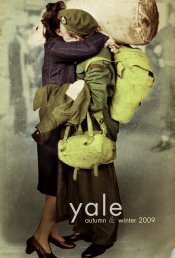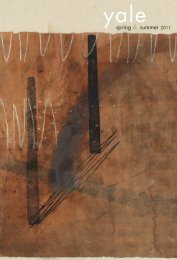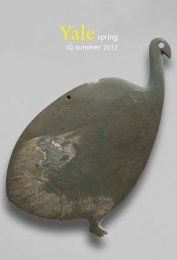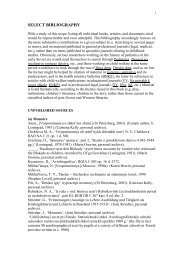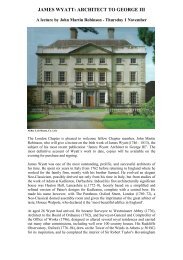View & Download - Yale University Press
View & Download - Yale University Press
View & Download - Yale University Press
You also want an ePaper? Increase the reach of your titles
YUMPU automatically turns print PDFs into web optimized ePapers that Google loves.
74 Environment & Nature<br />
Water 4.0<br />
The Past, Present, and Future of the World’s Most Vital Resource<br />
David L. Sedlak<br />
Turn on the tap, and water pours out. Pull out the plug, and the dirty water disappears. Most of us<br />
give little thought to the hidden systems that bring us water and take it away, but these<br />
underappreciated marvels of engineering face an array of challenges that cannot be solved without a<br />
fundamental change to our relationship with water, explains this book. To make informed decisions<br />
about the future, we need to understand the three revolutions in urban water systems that have<br />
occurred over the past 2,500 years and the technologies that will remake the system.<br />
The author starts by describing Water 1.0, the early Roman aqueducts, fountains and sewers that<br />
made dense urban living feasible. He then details the development of drinking water and sewage<br />
treatment systems – the second and third revolutions in urban water. He offers an insider’s look at current systems that rely on<br />
reservoirs, underground pipe networks, treatment plants and storm sewers to provide water that is safe to drink, before addressing<br />
how these water systems will have to be reinvented. For everyone who cares about reliable, clean, abundant water, this book is<br />
essential reading.<br />
David L. Sedlak is the Malozemoff Professor of Civil and Environmental Engineering at the <strong>University</strong> of California, Berkeley.<br />
February 288 pp. 234x156mm. 30 b/w illus. HB ISBN 978-0-300-17649-0 £20.00*<br />
The Climate Casino<br />
Risk, Uncertainty, and Economics for a Warming World<br />
William Nordhaus<br />
Climate change is profoundly altering our world in ways that pose major risks to human societies and<br />
natural systems. We have entered the Climate Casino and are rolling the global-warming dice, warns<br />
economist William Nordhaus. But there is still time to turn around and walk back out of the casino,<br />
and in this essential book the author explains how.<br />
Bringing together all the important issues surrounding the climate debate, Nordhaus describes the<br />
science, economics and politics involved – and the steps necessary to reduce the perils of global warming.<br />
Using accessible language and taking care to present different points of view, he discusses the problem<br />
from the beginning, where warming originates in our personal energy use, to the end, where societies<br />
employ regulations or taxes or subsidies to slow the emissions of gases responsible for climate change.<br />
Nordhaus offers a new analysis of why earlier policies, such as the Kyoto Protocol, failed to slow carbon dioxide emissions, how<br />
new approaches can succeed, and which policy tools will most effectively reduce emissions. In short, he clarifies a defining<br />
problem of our times and lays out the next critical steps for slowing the trajectory of global warming.<br />
William Nordhaus is Sterling Professor of Economics at <strong>Yale</strong> <strong>University</strong>. He is author of the award-winning A Question of Balance:<br />
Weighing the Options on Global Warming Policies, published by <strong>Yale</strong>.<br />
November 320 pp. 210x140mm. 46 b/w illus. HB ISBN 978-0-300-18977-3 £20.00*<br />
The Bet<br />
Paul Ehrlich, Julian Simon, and Our Gamble over Earth’s Future<br />
Paul Sabin<br />
In 1980, the iconoclastic economist Julian Simon challenged celebrity biologist Paul Ehrlich to a bet.<br />
Their wager on the future prices of five metals captured the public’s imagination as a test of coming<br />
prosperity or doom. Ehrlich, author of the landmark book The Population Bomb, predicted that rising<br />
populations would cause overconsumption, resource scarcity and famine – with apocalyptic<br />
consequences for humanity. Simon optimistically countered that human welfare would flourish<br />
thanks to flexible markets, technological change and our collective ingenuity.<br />
The Bet weaves the two men’s lives and ideas together with the era’s partisan political clashes over the<br />
environment and the role of government. In a lively narrative leading from the dawning<br />
environmentalism of the 1960s through the pivotal presidential contest between Jimmy Carter and<br />
Ronald Reagan and on into the 1990s, Paul Sabin shows how the fight between Ehrlich and Simon – between environmental fears<br />
and free-market confidence – helped create the gulf separating environmentalists and their critics today.<br />
Paul Sabin is associate professor, Department of History, <strong>Yale</strong> <strong>University</strong>. He was founding director of the Environmental<br />
Leadership Program, a national nonprofit organisation.<br />
September 320 pp. 210x140mm. 24 b/w illus. HB ISBN 978-0-300-17648-3 £18.99*<br />
Translation rights: McCormick & Williams, New York




